

By Gary Dretzka Dretzka@moviecitynews.com
A classics dilemma…
 DVD became so popular, so fast, that it created opportunities for the exploitation of classic titles only hinted at in the evolution of VHS. It didn’t take long for consumers to become aware of the superiority of the new technology, even over laserdiscs and Beta cassettes. As sales of DVD hardware reached a critical mass, movie buffs demanded the release of classics they already owned in VHS, too impatient to wait for digitally enhanced restorations and beaucoup bonus features.
DVD became so popular, so fast, that it created opportunities for the exploitation of classic titles only hinted at in the evolution of VHS. It didn’t take long for consumers to become aware of the superiority of the new technology, even over laserdiscs and Beta cassettes. As sales of DVD hardware reached a critical mass, movie buffs demanded the release of classics they already owned in VHS, too impatient to wait for digitally enhanced restorations and beaucoup bonus features.
The studios themselves were slow to realize just how important the extras would become in the DVD marketplace. Once they did, however, directors were encouraged to open their sets to studio-approved videographers and powder-puff interviewers. The filmmakers, themselves, saw the bonus features as an opportunity to rectify the ills inflicted on them by philistine producers and studio honchos.
Now that consumers appear ready to add high-definition playback units to their home-theater system, there’s a rush to get another iteration of previously released product onto shelves. In another year or two, the recycling process will begin, again, in high-def.
It explains how essential titles in an artist or studio’s repertoire have begun to appear in multiple collectible boxed sets, and how a first-time DVD release might only be made available in higher-priced sets. Then, too, consumer demand for modern hits – Zodiac, Apocalypse Now Redux, Lord of the Rings – now results in prompt few-frill releases, to be followed shortly thereafter by fully realized packages.
Among the many special sets made available in January were The John Frankenheimer Collection, with The Manchurian Candidate, The Train, Ronin and, new-to-DVD, The Young Savages, and Cary Grant: 4-Disc Collector’s Set, with Indiscreet, Operation Petticoat, The Grass Is Greener and That Touch of Mink, parts of which are little improved from previous versions.
Faring much better are titles that have benefitted from digital restoration and upgraded bonus material. El Cid: 2-Disc Deluxe Edition is far superior to previous editions and Limited Collector’s Edition is given a posh package. Landmark birthdays also inspire facelifts: An Affair to Remember: 50th Anniversary Edition, In the Heat of the Night: 40th Anniversary Collector’s Edition and Groundhog Day: 15th Anniversary Edition.Even a Criterion Collection edition of Monty Python’s Life of Brian couldn’t stop the new The Immaculate Edition. Sony has done the right thing, though, by also releasing it on BluRay.
The re-release of National Treasure in an expanded Two-Disc Collector’s Edition preceded last month’s highly successful launch of National Treasure: Book of Secrets.Paramount first released Braveheart in 2000, four years after it was named Best Picture and came out in VHS. It has since been included in Paramount’s Mel Gibson Ultimate Collection, Best Picture Collection, The Epic Legends Collection and the new Braveheart: Special Collector’s Edition. A hi-def version probably isn’t far away.
Warner Home Video has kindly – if quietly — released several interesting titles that didn’t quite fit a niche. In Payday (1972), Rip Torn turned in a powerful portrayal of a manipulative country-western singer, who’s at a maddening crossroads in his career; Richard Lester directed Jack Weston, Rita Moreno, Jerry Stiller, Kaye Ballard and F. Murray Abraham in the farcical bathhouse comedy, The Ritz. It was one of the first movies to recognize the growing out market for gay-themed movies; Melvyn Douglas and Lila Kedrova shine in Lee Grant’s poignant, Tell Me a Riddle. Robert Townes’ Personal Best starred Mariel Hemingway as a runner who falls in love with another woman while they’re training for the 1980 Olympics. It was hailed as movie that observed same-sex love with a non-critical, and also captured the physical and psychological pain attendant to great achievements in amateur sports. Sondra Locke and Alan Arkin both were nominated for Oscars for their performances in The Heart Is a Lonely Hunter, adapted from a novel by Carson McCullers.
February 4, 2008
– Gary Dretzka













